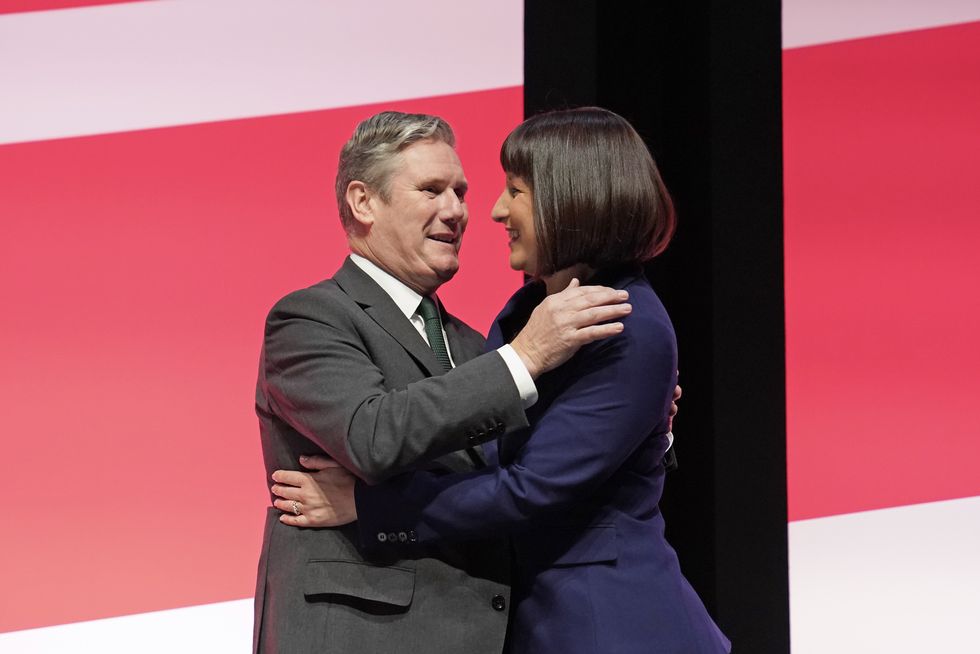Rachel Reeves said Labour’s 'defining economic mission is to restore growth to Britain'
PA
The Shadow Chancellor addressed the Labour Party's annual conference in Liverpool today
Don't Miss
Most Read
Trending on GB News
Shadow Chancellor Rachel Reeves gave a key-note conference speech short on specific policies but long on crowd-pleasing rhetoric, as she sought to reassure financial markets that a Labour administration would not borrow and spend irresponsibly.
With the Government already shelling out £110billion a year on debt interest – a huge 11 per cent of all tax revenue, second only to the NHS in terms of government spending – Reeves was cautious not to make policy pledges involving large rises in either expenditure or borrowing.
Throughout her speech, the Shadow Chancellor insisted repeatedly that “Labour is ready to serve, ready to lead and ready to rebuild Britain”. And in a departure from her party’s public reluctance to assume victory in the next general election, expected next year, she told delegates: “When we next meet, I intend to address this hall as Britain’s first female Chancellor of the Exchequer”.
She was much more cautious, though, when it came to announcing policies involving lots more government spending.
WATCH: Rachel Reeves addresses Labour members
The UK’s 30-year bond yields – which dictate the long-term cost of state borrowing – rose to a 25-year high last week, surpassing levels seen a year ago in the panic after Liz Truss’s mini-budget.
Borrowing costs for governments around the world have risen to the highest level in decades as investors bet that stubbornly high inflation will force global central banks to leave interest rates higher for longer.
These concerns are being made worse by the fact that oil prices have soared from around $70 a barrel in June to around $90 now, largely due to supply restrictions imposed by Saudi Arabia and other members of the 13-nation Opec oil-exporters’ cartel.
In recent days, the explosion of violence in Israel, which threaten to cause instability across the broader Middle East, has driven further concerns that crude prices could soar even more.
LATEST DEVELOPMENTS:
 Rachel Reeves was much more cautious, though, when it came to announcing policies involving lots more government spendingPA
Rachel Reeves was much more cautious, though, when it came to announcing policies involving lots more government spendingPAThe rise in the cost of oil over the summer has already fuelled inflation – not least via more expensive petrol and diesel prices. That’s another reason the Bank of England and other central banks may have keep interest rates higher for longer, prolonging the cost-of-living crisis and raising the cost of debt servicing across the economy, for mortgage-holders, business and, above all, the government itself.
Against this background, the Shadow Chancellor vowed to raise the minimum wage – a move that appeals to Labour delegates and voters but would largely be paid for by private sector businesses. She also pledged to charge VAT on private school fees while “cracking-down on Tory ministers’ private jet habit”, two more measures which drew huge cheers from the conference hall in Liverpool.
But with her “new charter for fiscal responsibility”, bolstering the powers of the Office for Budget Responsibility, the Whitehall fiscal-watchdog, the Shadow Chancellor tried to present her party as more fiscally prudent than the Conservatives, vowing to usher in an “era of economic security” under Labour.
“Never again will a Prime Minister and Chancellor be able to wreck our economy, rushing through un-costed plans,” declared Reeves, in a direct reference to Truss and her Chancellor Kwasi Kwarteng. “Responsibility must always come first,” she said. “You cannot tax and spend your way to economic growth”.
It’s a message designed to appeal to financial markets, and the centre-right swing voters thinking of defecting from the Tories, that Labour needs to woo to win office.
But Ms Reeves’ determination not to open the nation’s purse strings is likely to frustrate many on the left of her party, who traditionally view Labour as as a vehicle to raise taxation, boost government spending and generally expand the role of the state.








